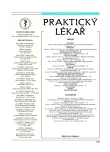-
Medical journals
- Career
Effect of eradicating H. pylori on the appearance of esophageal reflux disease: Randomized double blind study
Authors: J. Martínek 1; J. Špičák 1; M. Beneš 1; M. Zavoral 2; M. Lukáš 3; V. Mandys 4; P. Kocna 5; J. Kykal 6
Authors‘ workplace: Klinika hepatogastroenterologie, IKEM, Praha přednosta doc. MUDr. J. Špičák, CSc. 1; II. interní oddělení ÚVN a Subkatedra gastroenterologie IPVZ, Praha přednosta doc. MUDr. M. Zavoral, PhD. 2; Gastrocentrum, IV. interní klinika VFN, Praha přednosta doc. MUDr. A. Žák, DrSc. 3; Ústav patologie III. LF UK a FN KV, Praha pfiednosta prof. MUDr. V. Mandys, DrSc. 4; Ústav klinické biochemie VFN a I. LF UK, Praha přednosta prof. MUDr. T. Zima, DrSc. 5; Interní oddělení Nemocnice Říčany primář MUDr. J. Kykal 6
Published in: Prakt. Lék. 2005; 85(3): 133-138
Category: Reviews
Overview
Background and aims:
Eradication of H. pylori may provoke gastroesophageal reflux disease (GERD) but many studies don’t support this hypothesis. The aim of our randomized, double blind study was to find out whether the eradication of the infection is a risk factor for the development of GERD.Methods:
One hundred and twenty-six patients with functional dyspepsia participated at screening and 40 patients were randomized. All were infected by H. pylori. Twenty patients received the eradication treatment (omeprazol, amoxicillin and clarithromycin for 7 days) and 20 patients received placebo instead of antibiotics. The follow-up was 12 months. The main endpoint was the development of GERD defined as reflux esophagitis and/or typical reflux symptoms.Results:
The follow-up was completed in 38 patients (19 in each group). De novo GERD was observed in 1 patient (in the placebo group). Dyspeptic symptoms significantly improved in 79% of patients in the eradication group and in 58% patients in the placebo group (p<0.05). Successful eradication was achieved in 89.5% of patients. We confirmed the reliability of stool antigen test for the detection of H. pylori. The Rwas false negative in 18% of patients.Conclusions:
1. Keeping in mind the small number of randomized patients, we did not observe a higher risk of development of GERD following eradication of H. pylori infection. 2. The efficacy of eradication regimen with omeprazole + 2 antibiotics was very high. 3. Both the eradication and short – term course of acid suppressive therapy are effective for the treatment of functional dyspepsia. 4. RUT alone is not appropriate to make a diagnosis of H. pylori infection.Key words:
Helicobacter pylori – gastroesophageal – reflux disease – eradication.
Labels
General practitioner for children and adolescents General practitioner for adults
Article was published inGeneral Practitioner

2005 Issue 3-
All articles in this issue
- Post-traumatic strabism in adults (case report)
- Treatment of pain in the locomotor apparatus with the non-steroid anti-rheumatic of choice, nimesulid
- Rehabilitation and psychotherapy of patients suffering initial and chronic psychotic affections – Complex care at the day-patient community center “Fokus”
- Prescribing hypnotics in out-patient practice
- Informed selfcare
- Effect of eradicating H. pylori on the appearance of esophageal reflux disease: Randomized double blind study
- Virus hepatitis B and C – basic information
- Maintenance of the drain upon percutaneous transhepatic drainage of the biliary tract
- Oxygen in ophthalmology
- Replacement of the tricuspid valve and infective endocarditis
- General Practitioner
- Journal archive
- Current issue
- Online only
- About the journal
Most read in this issue- Maintenance of the drain upon percutaneous transhepatic drainage of the biliary tract
- Prescribing hypnotics in out-patient practice
- Effect of eradicating H. pylori on the appearance of esophageal reflux disease: Randomized double blind study
- Virus hepatitis B and C – basic information
Login#ADS_BOTTOM_SCRIPTS#Forgotten passwordEnter the email address that you registered with. We will send you instructions on how to set a new password.
- Career

